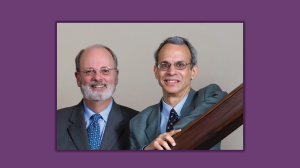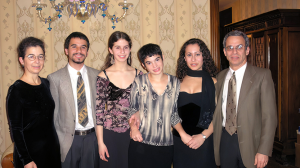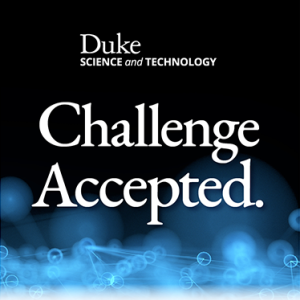Gift Honors Decades-Long Collaboration of Renowned Researchers
Bart Haynes, MD, HS’75, and Norm Letvin, MD, first met and began collaborating in 1991. At the time Haynes’s lab had just developed its first HIV vaccine candidate. The year before, Haynes and Dani Bolognesi, MD, had established the Duke Human Vaccine Institute (DHVI) to support interdisciplinary research at Duke for vaccines and therapeutics to address HIV and other emerging infections.
Letvin, at Harvard, was one of the world’s experts on retroviruses in non-human primate studies who had made the seminal discovery that a simian immunodeficiency virus could cause an AIDS-like disease in rhesus monkeys, similar to what was happening in people with HIV/AIDS. He was also a leading expert on killer T-cell responses, which along with B cells are important parts of the immune system response to countering infection. So Haynes wrote Letvin — someone he had never met — a letter.
“I wrote Norm asking for his help to test the vaccine to see if it would induce a killer T-cell response. He was excited by the opportunity to collaborate. We both were,” said Haynes. The study produced the first of 55 papers they would go on to publish together.
Their collaboration would become one of the most important in HIV vaccine research and would lead to a lifelong friendship that lasted right up until Letvin’s death in 2012.
“It quickly became apparent that we were kindred spirits,” said Haynes. “He was a meticulous researcher and very thoughtful in his work. We were both passionate about solving the AIDS epidemic. As we continued to collaborate on grants and research, we got to the point where we would start the day by talking to each other on the phone at 7:30 or 8:00 every morning. Over time our laboratories essentially merged in the work we were doing to address the HIV vaccine problem.”
Together they went on to cofound the Center for HIV/AIDS Vaccine Immunology (CHAVI) consortium in 2004. CHAVI was funded by the National Institutes of Health the next year at $315 million over seven years and brought together 50 institutions and over 100 subcontractors to try to figure out why the world still didn’t have an effective HIV vaccine after 25 years of effort. The consortium was a novel idea that brought together large groups of researchers to share data and ideas in real time to overcome the immunological roadblocks preventing the development of an HIV vaccine.
It took a year to come to fruition, but eventually the collaborative relationship Haynes and Letvin had fostered between their respective laboratories took root within the consortium. Today, 18 years later, the consortium continues to meet weekly, and is now making HIV vaccines and testing them in Phase I clinical trials.
“Their shared leadership and mutual trust set the tone for the entire CHAVI consortium effort and its collaborative spirit,” recalled Letvin’s wife, Marion Stein, MD. “The culture of respect and group collaboration at DHVI is exemplary, and while essential for progress in any field, it is particularly important in the complex fields of HIV, tuberculosis, and vaccine research.”
Haynes and Letvin’s embodiment of collaboration in advancing HIV vaccine research inspired Stein to support vaccine research at DHVI. Her endowed gift of $6.6 million, in memory of her late husband and to honor Haynes, will significantly advance the development and delivery of new vaccines and therapies for HIV/AIDS, tuberculosis, and other emerging threats.
“DHVI’s ongoing emphasis on collaboration best embodies my late husband's approach to science,” she said. “And it is this admirable and seminal quality that was the inspiration to support Haynes and research at DHVI.”
The gift will support both a full professorship and an assistant/associate professorship in immunology, molecular and cell biology, and infectious disease research including, but not limited to, HIV and tuberculosis, as well as a $1.1 million research fund endowment focused on delivering new vaccines and therapies for HIV, tuberculosis, and other emerging threats. This is the largest philanthropic gift DHVI has received to date and is the first to fund professorships in immunology and infectious disease research.
“This is an exciting gift that will advance our current efforts on HIV and for tuberculosis and other emerging diseases,” said Haynes. “The professorships will help us recruit or retain outstanding young and mid-level scientists who embody the ideals that infused Norm’s work, thus ensuring the sustainability of DHVI and its programs, and to continue our work on the difficult problems that Norm dedicated his life to addressing.”
Stein’s gift is part of the Duke Science and Technology initiative, which aims to elevate excellence in the sciences and foster transformational advances in fields that address the critical challenges facing the world today through faculty recruitment and retention.





